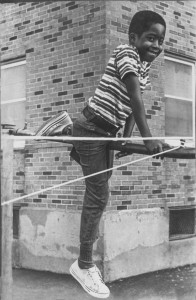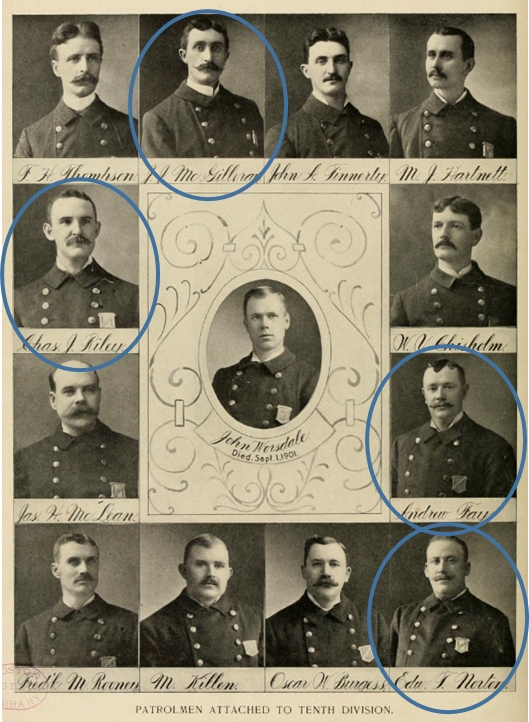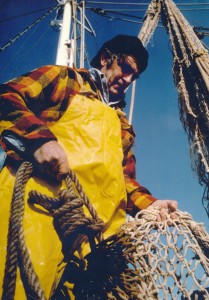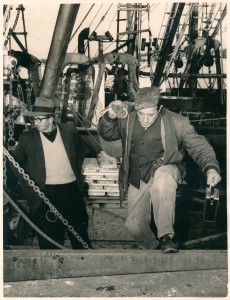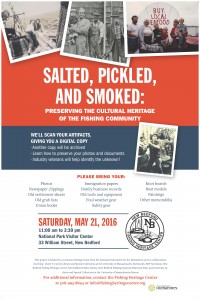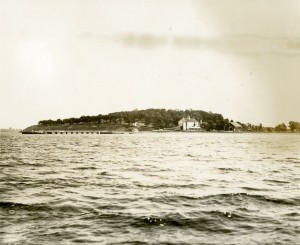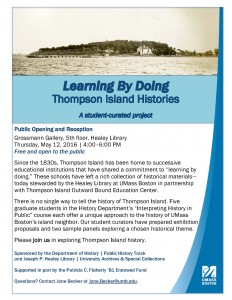The photographs, stories, and videos collected as part of “Making a History of Columbia Point: A Participatory Exhibition” are now available for research online at openarchives.umb.edu. The event, held at the Harbor Point Clubhouse on Saturday, May 9, 2015, was the culminating practicum project of Professor Jane Becker’s graduate public history seminar (History 625) at the University of Massachusetts Boston.
The students presented an informal temporary display exploring the history of this part of Dorchester, and they invited community members, past and present, to help tell the story. Attendees added events to an historical timeline and defined and identified the locations of important places in the community. Ten participants brought a total of 100 photographs and other documents to be scanned and added to the digital collections at UMass Boston. Together, these materials provide a variety of perspectives on how Columbia Point changed from the 1950s to the 1990s.
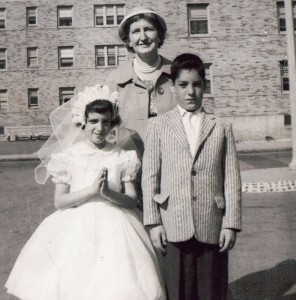
Eileen Conway’s First Communion, 1960. “My mother worked hard to keep us well dressed. Pictured: Eileen Conway, my mother Marie Conway, and Frank Conway.” Contributor: Jim Conway.
Many former residents shared memories of attending St. Christopher’s Church over the years. They contributed photographs of first communions, Easter Sunday, and other religious occasions. Images of parish sports teams and community events organized by the church are also included.
The Sisters of Notre Dame are documented in many of the photographs gathered. Project Care and Concern, an organization dedicated to serving low-income individuals and families, and the Notre Dame Montessori School, which operated for decades in the basement of St. Christopher’s Church, are documented in the collection.
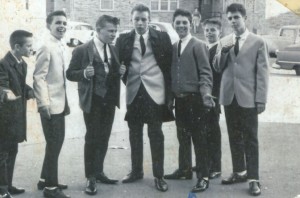
Easter Junior Gems, 1963 or 1964. “Favorite place ever, PERIOD!!! Pictured, from left to right: Leo Manning, Tom ‘Greek’ Stephens, Joe Steverman, Paul ‘Red’ Chadwick, Jimmy Carter, [?] Donahue, and Peter Connell. Location: probably 100 Monticello Avenue.” Contributor: Jim Chadwick.
Eleven black-and-white photographs document the early days of the Phillips Brooks House Association summer school on Columbia Point. Through this program, launched in the late 1960s, a number of students from Harvard University lived in the housing project and served as “big brothers” to neighborhood children.
For a reflection on this project by Paige Kinder, one of the students in the class, please visit www.archivespublichistory.org.
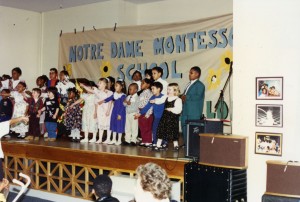
25th anniversary celebration at Notre Dame Montessori School, 1994. Contributor: Sister Elizabeth Calcagni.
For questions about the practicum project and the public history of Columbia Point, please contact Carolyn Goldstein at carolyn.goldstein@umb.edu and Jane Becker at jane.becker@umb.edu.
Explore the images and stories gathered at this event here.
For more resources on the history and development of Columbia Point, please visit umb.libguides.com/columbia-point.
University Archives and Special Collections at UMass Boston is actively seeking to build its Dorchester and neighborhood collections. Do you have collections related to the history and development of Columbia Point that you are interested in donating to the Archives? If so, please review our policies and guidelines for collection donations and contact us at library.archives@umb.edu.
University Archives & Special Collections in the Joseph P. Healey Library at UMass Boston collects materials related to the university’s history, as well as materials that reflect the institution’s urban mission and strong support of community service, notably in collections of records of urban planning, social welfare, social action, alternative movements, community organizations, and local history related to neighboring communities.
University Archives & Special Collections welcomes inquiries from individuals, organizations, and businesses interested in donating materials of an archival nature that that fit within our collecting policy. These include manuscripts, documents, organizational archives, collections of photographs, unique publications, and audio and video media. For more information about donating to University Archives & Special Collections, click here or email library.archives@umb.edu.
